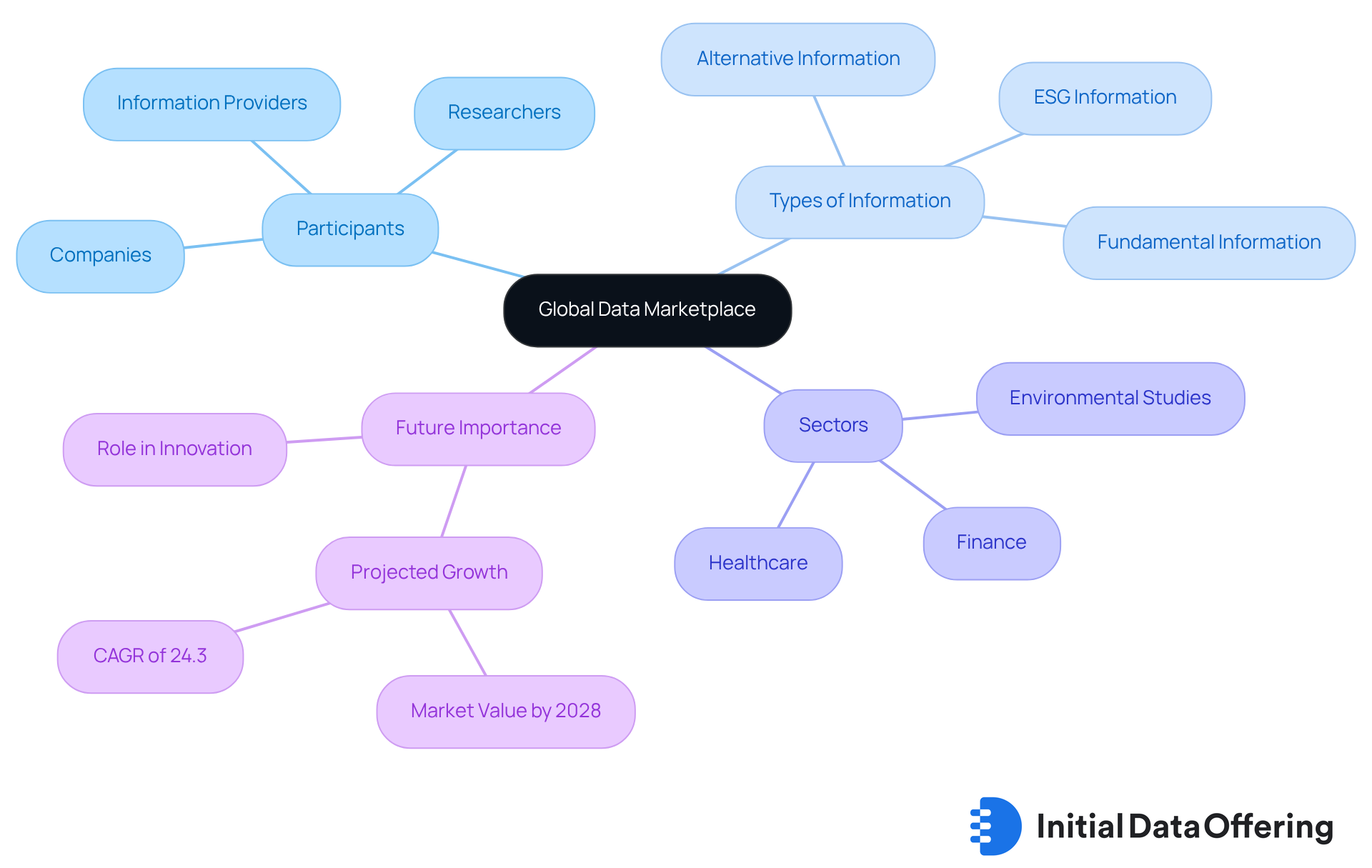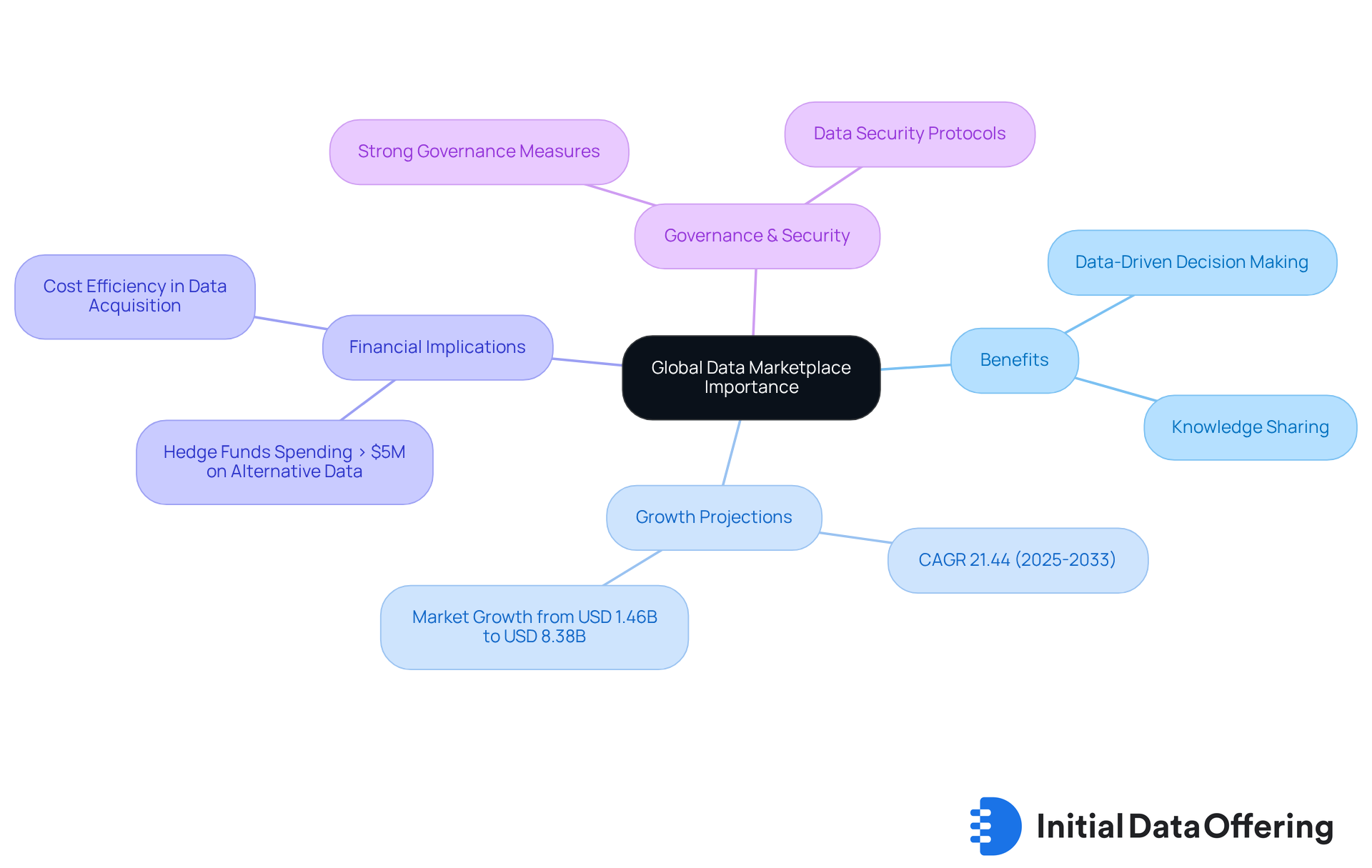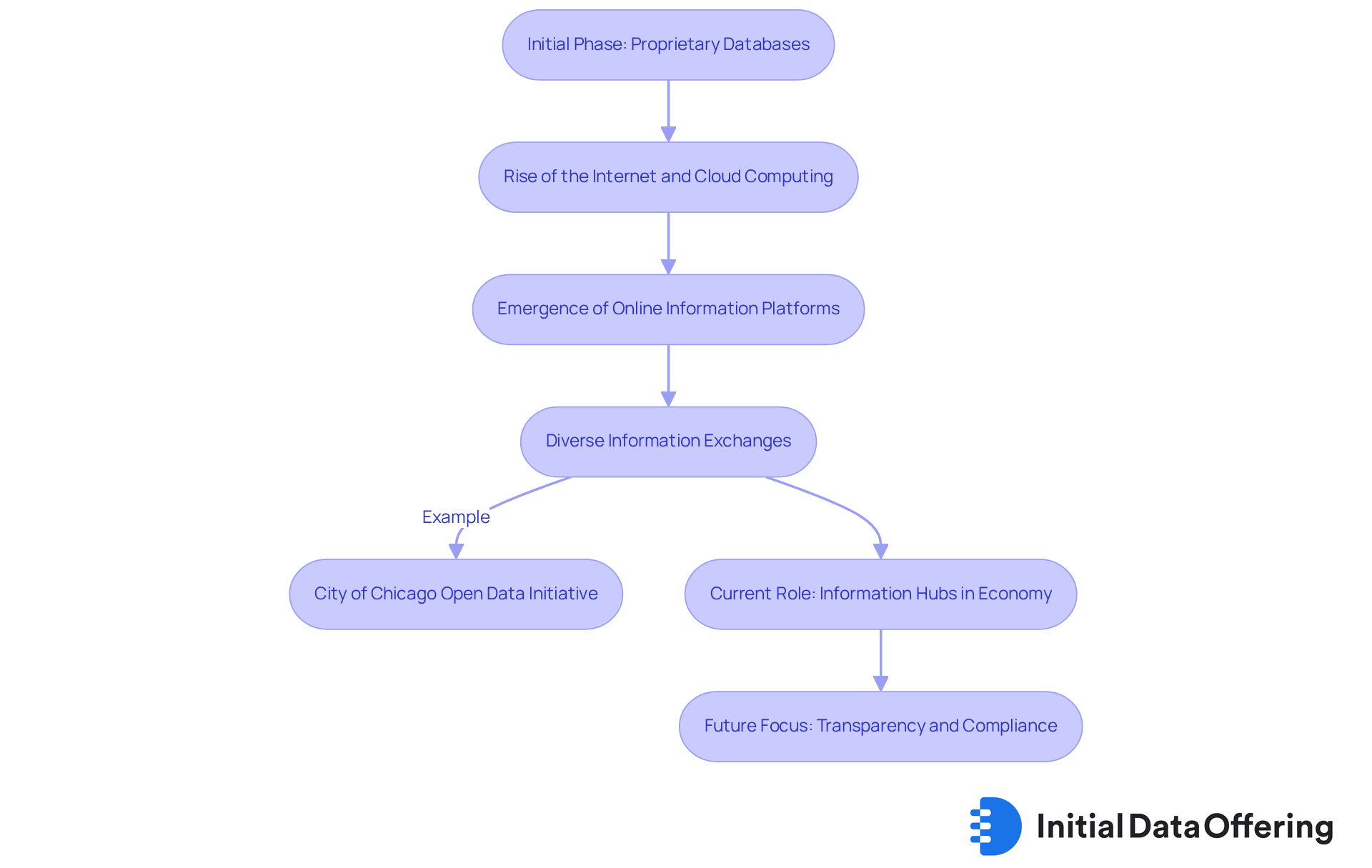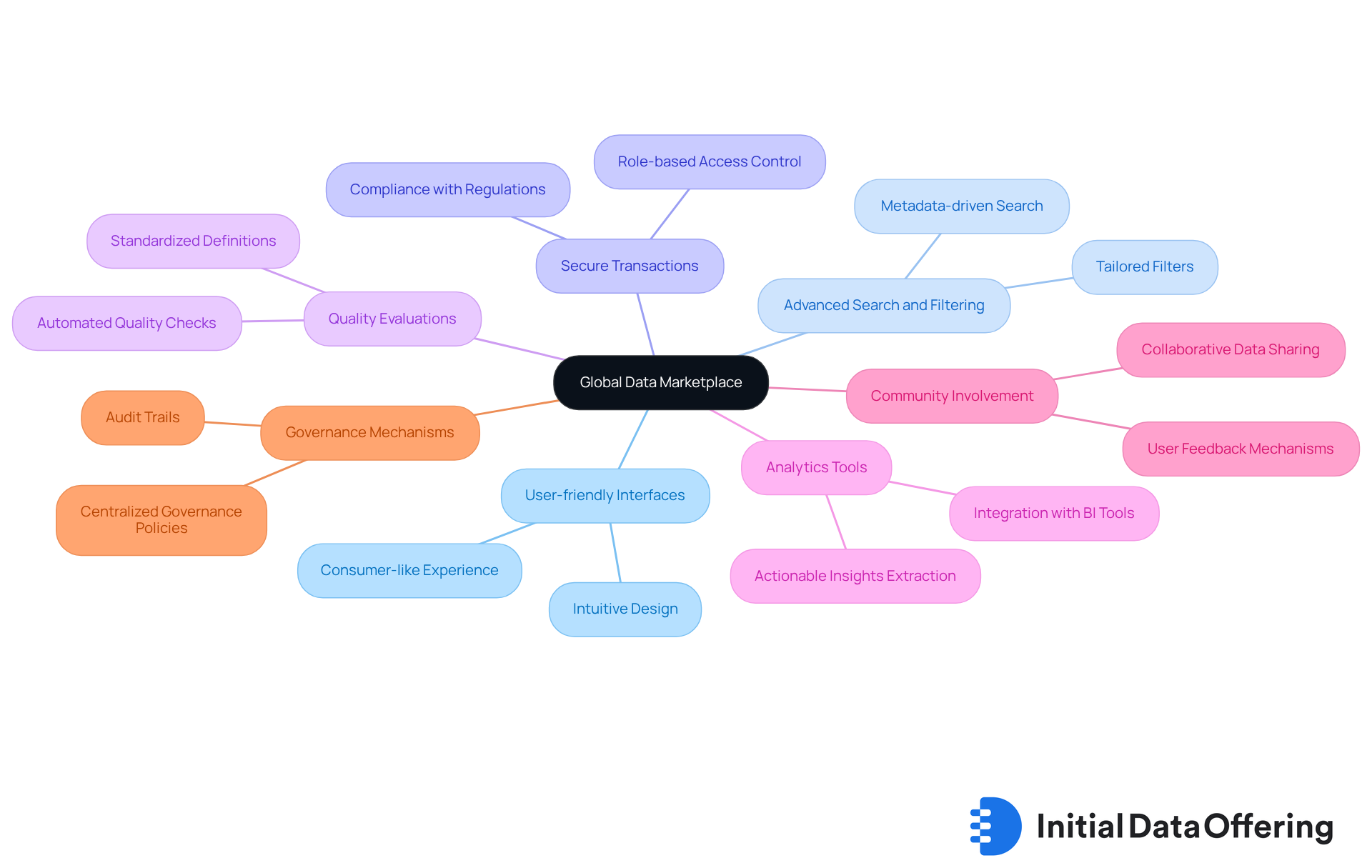Understanding the Global Data Marketplace: Definition and Importance

Understanding the Global Data Marketplace: Definition and Importance
Overview
The global data marketplace serves as a digital platform that facilitates the buying, selling, and sharing of information among various participants. This platform significantly enhances access to diverse datasets across multiple sectors. By democratizing information access, it fosters innovation and supports data-driven decision-making. These elements are crucial for organizations aiming to leverage information strategically in an evolving data economy. How can your organization utilize this marketplace to gain a competitive edge? The implications are profound, as organizations that engage with this marketplace can harness the power of data to inform their strategies and drive growth.
Introduction
The emergence of the global data marketplace signifies a transformative shift in information access and utilization across various sectors. This digital platform democratizes access to valuable datasets, equipping organizations with essential tools for informed decision-making and strategic innovation. As businesses increasingly rely on high-quality information to sustain a competitive edge, it is crucial to consider:
- How can entities effectively navigate this evolving landscape to harness the full potential of the data marketplace?
This question invites organizations to explore the myriad opportunities presented by this innovative platform.
Define Global Data Marketplace
The global data marketplace serves as a digital platform designed to facilitate the purchasing, selling, and sharing of information among a diverse group of participants, including companies, researchers, and information providers. This centralized hub acts as a global data marketplace, empowering information consumers to discover, evaluate, and acquire datasets tailored to their specific needs. Unlike traditional trading platforms that focus on physical goods, the global data marketplace operates in a digital environment, enabling seamless transactions and interactions between information suppliers and users. By 2025, the global data marketplace is projected to experience a significant increase in the number of active information exchanges worldwide, reflecting the rising demand for high-quality information across various sectors.
These platforms encompass a wide array of information types, including:
- Alternative information
- ESG information
- Fundamental information
They cater to sectors such as finance, healthcare, and environmental studies. The importance of the global data marketplace cannot be overstated; it not only democratizes access to valuable datasets but also empowers entities to leverage information for innovation and strategic decision-making. In 2021, the financial services sector alone accounted for the largest share of revenue in the information platform market, underscoring the critical role these platforms play in enhancing business intelligence and operational efficiency.
As we advance toward 2025, the significance of the global data marketplace will continue to grow, acting as essential resources for organizations seeking to harness the potential of information. They foster innovation by providing the necessary infrastructure for advancements in AI and machine learning, fundamentally transforming how entities access, share, and utilize information.

Contextualize Its Importance in Data Strategy
The global data marketplace serves as a vital component in contemporary information strategy, providing organizations with access to high-quality collections that can drive insights and foster innovation. In a time when information is recognized as a crucial resource, businesses must harness the potential of the global data marketplace to enhance their decision-making processes. Information exchanges enable companies to quickly identify and acquire relevant collections from the global data marketplace, significantly reducing the time and effort required to gather information independently. This accessibility not only encourages data-driven decision-making but also strengthens competitive positioning within the global data marketplace, allowing businesses to respond promptly to market fluctuations and consumer needs.
Moreover, the collaborative nature of information exchanges in a global data marketplace facilitates knowledge sharing and innovation across various sectors, ultimately benefiting the broader economy. However, it is essential for organizations to implement strong governance and security measures in the global data marketplace to safeguard sensitive information from unauthorized access during external sharing. The global information exchange platform sector is projected to grow from USD 1.46 billion in 2024 to USD 8.38 billion by 2033, reflecting a compound annual growth rate (CAGR) of 21.44% from 2025 to 2033. Additionally, larger hedge funds are expected to exceed $5 million in spending on alternative information sources, underscoring the financial implications of leveraging information platforms.

Trace the Evolution of Data Marketplaces
The development of information marketplaces over the last twenty years signifies a notable change in how entities share and access information. Initially, information sharing was confined to proprietary databases and internal systems, which restricted organizations' ability to tap into external sources. However, the rise of the internet, coupled with advancements in cloud computing and large-scale analytics, catalyzed a transformation in this landscape. As a result, online information platforms emerged, democratizing access to resources and enabling a broader array of users to engage with valuable collections.
In the early stages, platforms primarily catered to specific sectors or types of information. Yet, as the demand for diverse collections increased, more extensive exchanges began to surface. For instance, the City of Chicago's open information initiative exemplifies how public datasets can be leveraged for market research and development, showcasing the potential of information sharing for innovation. This trend reflects a broader movement where entities recognize the significance of external information, as noted by Rija Jawad, who describes a data exchange as a 'storefront for resources.'
Currently, information hubs play a crucial role in the information economy, providing an organized environment for information exchange and collaboration among various participants. They empower organizations to capitalize on their information assets, participate in the information economy, and enhance their decision-making capabilities. According to IDC, 75% of enterprises in 2021 utilized external information sources from the global data marketplace to bolster their cross-functional capabilities, highlighting the growing reliance on such information sources. As these platforms continue to evolve, they increasingly focus on transparency, flexibility, and compliance, ensuring users can navigate the complexities of information sharing within a privacy-conscious framework. Experian emphasizes that an effective information strategy involves recognizing the importance of adaptability and accuracy, which are essential as information purchasers respond to new demands.

Identify Key Characteristics and Components
Key features of a global data marketplace include user-friendly interfaces, advanced search and filtering functionalities, and secure transaction procedures. These platforms function as a global data marketplace, offering a diverse array of information sets categorized by type, industry, and application, which facilitates straightforward navigation for users seeking pertinent information. The emphasis on quality evaluations ensures that accessible datasets in the global data marketplace conform to specific standards, which is critical considering that 50% of companies struggle to obtain trustworthy information. Additionally, 92% of companies agree on the necessity to improve their utilization of external information sourcing, highlighting the growing demand for efficient information exchanges within the global data marketplace.
The integration of analytics tools further empowers users to extract actionable insights from the information they acquire. Furthermore, many information platforms promote community involvement by enabling users to provide feedback, evaluate datasets, and share best practices. This collaborative approach not only enhances the overall value and functionality of the platform but also fosters an information-driven culture. As Lucy Kelly remarked, 'Information marketplaces are intended for use by everyone, not just scientists or analysts.' This cooperative method enhances user satisfaction, as intuitive interfaces and robust search functionalities are essential for maximizing the effectiveness of information discovery.
Moreover, governance mechanisms are critical for ensuring compliance and security, reinforcing trust among data consumers and providers. How can your organization leverage these features to improve decision-making? By understanding and utilizing these platforms effectively, companies can navigate the complexities of information sourcing within the global data marketplace and enhance their operational efficiency.

Conclusion
The global data marketplace signifies a pivotal advancement in how organizations access and utilize information, fundamentally reshaping the landscape of data-driven decision-making. By offering a centralized platform for the buying, selling, and sharing of diverse datasets, it empowers businesses and researchers to harness valuable insights that drive innovation and strategic growth.
Throughout this article, we have explored key insights that highlight the marketplace's role in democratizing access to information, enhancing operational efficiency, and fostering collaboration across various sectors. The evolution of these platforms has transformed information sharing from proprietary systems to open exchanges, enabling a broader range of users to engage with essential datasets. As organizations increasingly recognize the necessity of leveraging external information sources, the global data marketplace emerges as a crucial resource for driving competitive advantage.
In conclusion, as the demand for high-quality information continues to rise, organizations must actively engage with the global data marketplace to unlock its full potential. How can embracing this digital platform enhance decision-making capabilities and support a culture of innovation and adaptability? The future of data-driven strategies hinges on effectively navigating this evolving landscape, making it imperative for businesses to acknowledge the significance of the global data marketplace in their overall information strategy.
Frequently Asked Questions
What is a global data marketplace?
A global data marketplace is a digital platform designed for the purchasing, selling, and sharing of information among various participants, including companies, researchers, and information providers.
How does the global data marketplace differ from traditional trading platforms?
Unlike traditional trading platforms that focus on physical goods, the global data marketplace operates in a digital environment, enabling seamless transactions and interactions between information suppliers and users.
What types of information can be found in the global data marketplace?
The global data marketplace includes a wide array of information types, such as alternative information, ESG (Environmental, Social, and Governance) information, and fundamental information.
Which sectors benefit from the global data marketplace?
Sectors such as finance, healthcare, and environmental studies benefit from the global data marketplace.
Why is the global data marketplace important?
The global data marketplace democratizes access to valuable datasets, empowering organizations to leverage information for innovation and strategic decision-making, thereby enhancing business intelligence and operational efficiency.
What was the role of the financial services sector in the information platform market in 2021?
In 2021, the financial services sector accounted for the largest share of revenue in the information platform market, highlighting the critical role these platforms play in enhancing business intelligence.
What is projected for the global data marketplace by 2025?
By 2025, the global data marketplace is projected to experience a significant increase in the number of active information exchanges worldwide, reflecting the rising demand for high-quality information across various sectors.
How does the global data marketplace contribute to innovation?
The global data marketplace fosters innovation by providing the necessary infrastructure for advancements in AI and machine learning, transforming how entities access, share, and utilize information.